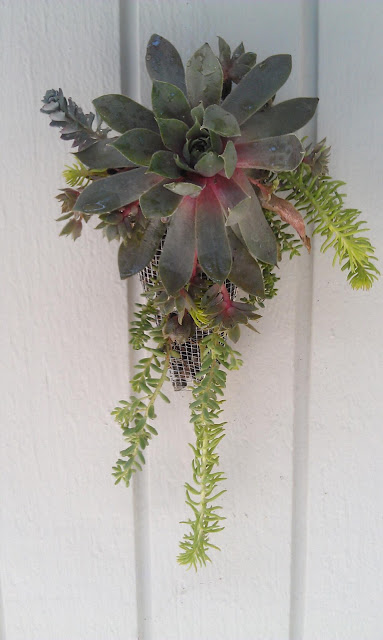While wandering around the garden, I realized just how many succulents are beautifully symmetrical. I just wanted to show the loveliness.
Succufiend
obsessive succulent gardening
Tuesday, May 28, 2013
Monday, May 13, 2013
Aeonium Love
Aeoniums are cool season, winter growing succulents. They hunker down in heat and go dormant, still looking lovely. They LOVE Water, obviously flourishing with the excess we unknowingly provided them. I have never lost one to frost or heat intolerance. Snails love them though, so sprinkle bait.
Propagate your aeoniums by snapping off a branch and tucking it in the ground. Easy!
Photos show the difference in their growth habit depending on where I have them planted. I like both looks, though it's very exciting to finally have the huge lush aeonium bushes.
 |
| Aeonium bushes left and right, getting morning and afternoon sun and excess watering |
 |
| Aeonium Tabuliformae |
 |
| Aeonium Schwarzkopf |
 |
| new cuttings rooting in a succulent cone |
 |
| One aeonium plant with different color variations |
 |
| new Schwarzkopf plantings |
 |
| Aeonium in full hot sun with less water, keeping it sculptural and small |
 |
| Gift plant from a vendor at the Sacramento Cactus and Succulent show. Aeonium Leucoblepharium |
 |
| Aeonium Schwarzkopf |
 |
| Aeonium Cyclops |
 |
| The tiny Aeonium Silver Edge starter back in July 2012. |
 |
| a peek under the large bush showing the branches. |
 |
| aeonium canariense "silver edge" -huge amount of growth since July 2012. |
Saturday, May 11, 2013
Ghost plant, invisible plant.
I spent part of today removing rocks and filling in color around the graptopetalum paraguayense (the mass of white rosette type succulents pictured below). It really is the "ghost plant". It is lovely when you can see it. Unfortunately it blends right in with the river rocks, and looks less than exciting on dirt. I built up an area behind it and planted some sanseveria that needed a home. I was hoping that would help draw your eye to it. NOPE. I filled in the lovely yellow sedum nussbaumeranium with lonely sprigs from other places in the garden. Um, nope. Ok. So I added some blue Echeveria sproutlings. They will reach atleast 8 inches across. Now if they would only grow fast. My mom got me an Echeveria gibbiflora ruffles yesterday, so that found a new home. I'm still not happy with the look.
A few new ideas. I MAY pull the graptopetalum out at some point and use it for a dramatic pot. Or maybe, find a sedum that contasts really well and under plant it. It's also getting leggy. I may cut the rosettes off and stick them back in the ground (easy propagation!) All leaves that fell off have been tucked in the dirt around it. Maybe a tighter bunch would help. What an annoying, yet lovely, little white plant.
After pictures and before picture. Yep, you still can't see it.
Succulent Cone revamped
I decided to make another wire mesh cone today. I wanted brighter colors and different plants to stand out against the fence. After creating it, I decided the fence just wouldn't do them any justice and moved them to the white wall. MUCH BETTER. Anyhow, see the previous post, sempervivum cone, to see directions. To revamp them, I added bright green sedum varieties, blue sedum, aeonium and some graptopetalum paraguayensis. The sedum is easy to tuck into the wire mesh, even with roots on. I found hanging them with two nails, one at top and bottom, held them in place better. I added extra soil after they were securely hung as well, topping off with pea gravel.
Friday, May 10, 2013
Cement and Pumice containers
Cinder blocks are cheap, locally a little over $1.50 each. Push a square of fine gauge wire inside to keep the soil in. Many people have made cinder block container walls which are nice looking. We decided a more sculptural container would be fun. The blocks are glued together with construction adhesive.
Single cinder blocks are fun too.
Pumice stones are cheap at Rock Yards. Take the pumice stone and hammer out a bowl. They are really light and can easily be moved around for a different look or to change growing conditions. I make sure to add a lot of gravel into the soil to keep the roots from sitting in water. Water lightly.
.jpg) |
| Make the hole any size you want, but deep enough to hold the plant in. |
.jpg) |
| Cement blocks recycled from removing our shed makes a nice looking tall sculpture. |
Thursday, May 9, 2013
Easy Propagation of Succulents
.jpg) |
| a fallen sedum nussbaumeranium leaf sprouting |
.jpg) |
| Sedum robrotinctum leaf sprout |
.jpg) |
| old dead leaf sprouting in rocks and leaf mulch |
Stem cuttings will also grow roots. I have a graptopetalum paraguayensis (ghost plant) that I accidentally broke off a large branch of. I stuck it in dirt and it grew. That is how I always add additional plants now. Sedum, echeveria, aeonium, cactus etc... Be careful not to overwater causing rot. If rot happens, cut off the rotted tissue and replant.
.jpg) |
| Cactus pad that fell off, already rooted. |
.jpg) |
| broken bit of graptopetalum |
Aloes and Agaves will send "pups" up from the base. Those are easily separated by pulling them out at the base. They will already have roots and are ready to be planted.
.jpg) |
| aloe with a lot of pups |
.jpg) |
| easy removal of pups |
.jpg) |
| aloe saponaria and pup |
.jpg) |
| nice roots on this aloe saponaria pup |
.jpg) |
| sedum angelica |
























.jpg)
.jpg)
.jpg)
.jpg)
.jpg)
.jpg)
.jpg)
.jpg)
.jpg)
.jpg)
.jpg)